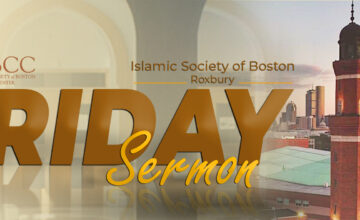(17) Methods of reforming oneself (Watching)
One of the effective ways to reform oneself is to have consciousness of Allah (SWT). This means that the Muslim should be alert and fully aware that Allah (SWT) is watching us all the time. And to know that he (SWT) is all-Knowing of all things whether it is in secret of public, day or night. Allah (SWT) says: “for Allah ever watches over you.” (An Nisa, 1).
In the famous Hadith the Prophet (PBUH) said: “Ihsan is to worship Allah (SWT) as if you see him, and to know that even though you don’t see him He sees you.” (Al Bukhari, 4777).
A poet once said: If you are ever by yourself do not say ‘I am alone’ but say ‘Allah is a watching me’. Never think that Allah is unaware of what you do or that you can hide something from Him.
The benefits of being conscious of Allah’s watchfulness:
1-It makes the Muslim feel modesty in his heart, which will prevent him from committing sins.
2- It makes the Iman of the Muslim stronger, and as a result his heart will be purified from hypocrisy.
3- The fruit of this consciousness is that the Muslim feels peace and tranquility in his heart and therefore he will experience no contradictions between his actions and intention.
The different aspects of the consciousness of Allah (SWT)
1- Consciousness of Allah (SWT). The Quran and the Sunnah teaches the Muslim to always be conscious of the watchfulness of Allah (SWT) in everything that he does, whether it is related to worldly matters or religious matters. Allah (SWT) says: “Seest thou not that Allah doth know (all) that is in the heavens and on earth? There is not a secret consultation between three, but He makes the fourth among them, – Nor between five but He makes the sixth,- nor between fewer nor more, but He is in their midst, wheresoever they be: In the end will He tell them the truth of their conduct, on the Day of Judgment. For Allah has full knowledge of all things.” (Al Mujadalah, 7). Allah (SWT) also says: “(Allah) knows of (the tricks) that deceive with the eyes, and all that the hearts (of men) conceal.” (Ghafir, 19).
It is very important for the Muslim to understand that Allah (SWT) knows the internal secrets as well as the internal and external state of being. Moreover, Allah (SWT) knows the hidden intentions and thoughts which have not come into existence yet.
2- Being conscious of the watchful eyes of the angels. The Muslim should understand that the angels have been appointed by Allah (SWT) to be witnesses on people. They have the duty of registering everything said or done by the person.
Allah (SWT) says about the angels in the Quran: “Behold, two (guardian angels) appointed to learn (his doings) learn (and noted them), one sitting on the right and one on the left. Not a word does he utter but there is a sentinel by him, ready (to note it).” (Qaf 17-18).
Allah (SWT) also says: “But verily over you (are appointed angels) to protect you,- Kind and honourable,- Writing down (your deeds): They know (and understand) all that ye do.” (Al Infitar, 10-12).
3- Being watchful of the physical parts. The physical parts of the person will be witnesses on him on the Day of Judgment. The ears, eyes, tongue, hands and legs will have the ability to speak on the day of judgment and they will say everything that they were involved in doing throughout this life.
Allah (SWT) says: “At length, when they reach the (Fire), their hearing, their sight, and their skins will bear witness against them, as to (all) their deeds.” (Fasselt, 20).Allah (SWT) also says: “That Day shall We set a seal on their mouths. But their hands will speak to us, and their feet bear witness, to all that they did.” (Ya seen, 65).
4- Being aware of the watchfulness of the earth itself. The part of earth on which you were standing when you committed sins or did good deeds will also be a witness on you. Allah (SWT) says: “On that Day will she declare her tidings: For that thy Lord will have given her inspiration On that Day will men proceed in companies sorted out, to be shown the deeds that they (had done).” (Al Zalzalah, 4- 6).
Examples from the companions and the righteous people:
Ibn Omar was walking once then he met with a shepherd who was herding his sheep. He wanted to test him so said to him, “sell me one of your sheep.” And the shepherd told him, “I am a slave (meaning that he does not own those sheep)”.
Ibn Omar said, “tell your master that the wolf ate it.” And the shepherds answer was, “what about Allah (SWT)”. Ibn Omar was impressed by the watchfulness of this man and his righteousness so he freed him from slavery and said to him, “these words have freed you from slavery in this life, and I wish that Allah (SWT) will save you in the hereafter because of them.”
Another good example is that of Omar Ibn Al-khatab during his rule of the Muslim Ummah. He heard a woman telling her daughter to mix milk and water. And the daughter said: “Amir Almu’mineen has prohibited us from doing this.” The mother then said, “Amir Almu’mineen does not see us.” And the daughters answer was, “Allah (SWT) sees us.” Omar Ibn Al-Khatab when he heard this he was impressed and he married her to one of his sons. This woman was the mother of the righteous Khalifa Omar Ibn Abdel-Aziz.
Finally, Abu-Hurairah (May Allah be Pleased with him) went to the market once and he found a man who was mixing water and milk, so he said to him: “what will you tell Allah (SWT) on the Day of Judgment when he tells you to separate the water from the milk?” The man started crying and he promised to never do it again.
Abu-Huraira used a very effective approach in the case of this man. He did not beat him, fine him or jail him, rather, he chose to awaken the watchfulness in his heart. This approach is the most proper way to deal with problems of the individuals as well as the problems of the society.
We invoke Allah (SWT) to lighten our punishment on the Day of Judgment.
Written by: Dr. Ahmed Shaheen
Professor in Al-Azhar University
And Islamic American University
Translated by: Abdullah Zettili




